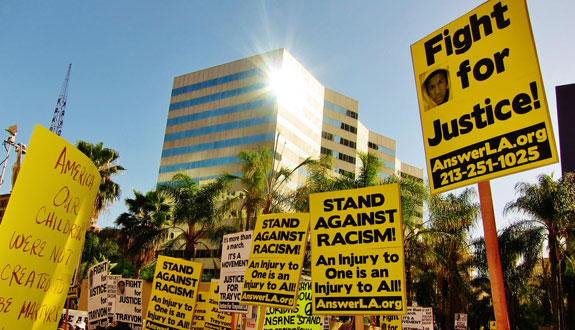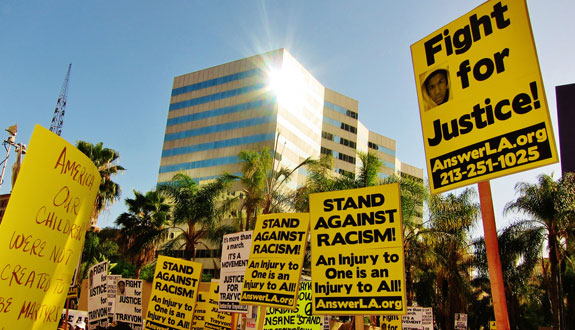Applying LSAT Logic to Coverage of the Trayvon Martin Case
- by
- Apr 21, 2012
- LSAT, News
- Reviewed by: Matt Riley


George Zimmerman’s bond hearing on second-degree murder charges in the shooting of Trayvon Martin was this morning; the judge, Kenneth R. Lester Jr., set bail at $150,000. In the months to come, the courts will assess the evidence against him. Should the case make it that far, a jury will eventually decide whether Zimmerman is guilty. Up until now, coverage of the case has revealed a web of conflicting accounts and personal attacks. We won’t try to figure out exactly what happened the night of February 26; instead, let’s look at some of the questionable logic that has come up in coverage of the case.
Zimmerman’s background and alleged racism. Some have claimed that Zimmerman wasn’t motivated by racial bias, and have cited as evidence his Hispanic background and his work with minority children. As Dave Chappelle demonstrated, having a minority background doesn’t preclude having prejudiced thoughts against minorities. Regarding the volunteer work, Sean Hannity claimed, “Now, if you were racist, I don’t think you’d be a mentor to minority children.” There’s an exclusivity fallacy at work in Hannity’s argument; he makes the assumption that you’re either wholly racist or you’re not. Hannity ignores the possibility that Zimmerman could do good in some situations and nonetheless be motivated by prejudices in others.
Zimmerman’s arrest. Zimmerman was not initially charged with any crime; police found no grounds to dispute his claim of self-defense under Florida’s Stand Your Ground provision. This decision was met with considerable public outrage. State attorney Angela Corey took over the investigation and made the eventual decision to charge Zimmerman. If Corey’s assessment of the facts differed from that of the original investigation and led to this decision, it’s the right decision. If, on the other hand, the decision was influenced by the public outcry demanding Zimmerman’s arrest, this is an unjustified appeal to popular opinion. The public perception of the case isn’t what determines Zimmerman’s guilt or innocence.
Trayvon Martin’s character. As the investigation proceeded, it was revealed that Martin was suspended from school for marijuana possession. Some have seized on this to impugn Martin’s character; here’s an example that draws on social media accounts to accuse him of not only using but also dealing drugs. This has no bearing on the facts of the case; it’s a classic ad hominem attack. Martin wasn’t found in possession of anything illegal. If he was in fact a drug dealer (and the evidence for this claim is tenuous at best), Zimmerman had no way of knowing this. Certainly there’s no reason Martin’s past experience with drugs would do anything to justify the shooting.
Can you think of any other logical fallacies associated with the Trayvon Martin case? Chime in in the comments.
Search the Blog

Free LSAT Practice Account
Sign up for a free Blueprint LSAT account and get access to a free trial of the Self-Paced Course and a free practice LSAT with a detailed score report, mind-blowing analytics, and explanatory videos.
Learn More
Popular Posts
-
logic games Game Over: LSAC Says Farewell to Logic Games
-
General LSAT Advice How to Get a 180 on the LSAT
-
Entertainment Revisiting Elle's LSAT Journey from Legally Blonde








